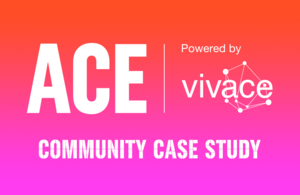Spotting transformative potential: Faculty’s ACE supplier story
Faculty specialises in using AI and data science in innovative ways to solve problems and arm decision-makers with better insights.

Vivace community member Faculty was founded in 2014 by three university friends, who had already spotted that artificial intelligence (AI) was going to be one of the transformative technologies of our time.
What started with a fellowship, a training programme designed to help academic STEM PhD students transition from campus to commercial data science roles, has grown to a business that employs more than 300 people, with business units covering government public sector, health and life sciences, energy and retail and consumer.
The company, which all three founders still work for, as CEO, CTO and head of fellowship, also offers ‘plug and play’ software products designed to help businesses of all types use AI for deeper insights, and hence more informed decisions.
Tom Nixon, Faculty’s head of government practice, said that Faculty’s “absolute core” is building AI systems for real world decision-making: “Essentially, 80% of our team’s work is building production AI, that is teams of data scientists, engineers, a delivery manager etc coming together, working on a customer problem to build an AI solution to that problem.”
Using AI to work smarter
The aim is that users, in everything from supply chain management to a multinational, the NHS or law enforcement, can use AI to improve elements of their jobs.
Faculty became aware of ACE through existing government work and has been a member of the Vivace community for about five years, working on around 30 commissions.
One has been looking at the potential to use large language models (LLMs) to create synthetic notes to help test privacy solutions within the health sector. Another project was in law enforcement, working with other suppliers and stakeholders to develop as well as integrate solutions to common and serious problems. Another looked at how data science could help detect extremist material in specific areas.
They have also done “very cool” things in terms of exploring how data sets can be uncovered, combined and analysed so they are used in new ways, to bring to light new information.
Overall, today around 1 in 15 projects Faculty delivers is for ACE.
In terms of how being part of ACE helps Faculty build its business, Nixon said: “It’s a great way of accessing new customers and new opportunities and has helped us build awareness of the types of problems big organisations have to solve.
The power of community
“So in terms of access to customers use cases, that’s a big, big tick. And I think the other real big tick has been the partnering across the sorts of firms that frankly, we’ve only known about or partnered with because of ACE. I think the partner and community aspect is really powerful.”
He also cites the speed of commissions: “It’s just way faster, more pragmatic and sensible, than almost any other government procurement we take part in”, adding: “The other thing I really like in the ACE model is the customer sets the problem they need to solve, and then leaves the community to work out innovative ways to solve it.”
The final positive, he says, is that the ACE model “really encourages suppliers to play to their strengths. So it’s like, here’s the problem and the small parts of this solution you can solve. Don’t pretend you can solve all of it and we’ll work out how to stitch it together with other suppliers who can solve their bits.”